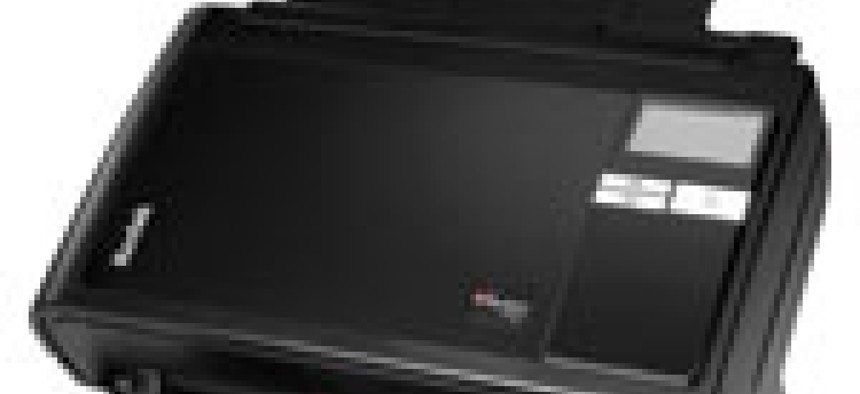Tiny scanner is perfect for road work


Connecting state and local government leaders
The Kodak i2800 is light and small enough to be portable, but its high throughput potential is anything but.
When going on the road, most users have their bases covered. They have their notebook computer and smart phone and often even a projector or printer built for portability, all ready to set up in a trade show booth or hotel room. But there is one area that usually suffers from being out of the office: scanning. Portable devices tend to scan at lower resolutions or take a long time, either of which cuts down on their usefulness. Most of the truly portable ones we have looked at over the years have been something akin to junk.
The i2800 from Kodak is, finally, a solidly built and fast-performing scanner that can fill this niche nicely. It can even do well as an office-based scanner that any executive would love to have on his or her desk. The i2800 weighs 12 pounds, which is about as light as a scanner like this is likely to get, and sits 9.7 inches high by 13 inches wide by 6.3 inches deep, which is as small as a portable printer. We were pleased to note that the i2800 is a dual-LED scanner, which allows for two-sided scanning with one pass.
One thing we did not expect to see on a scanner of this size was a document feeder with a 100-page capacity. That is about twice as large as would be expected of such a scanner.
Kodak i2800
Pros: Small and light, fast two-sided scans.
Cons: Document feeder output is a bit untidy.
Performance: A
Ease of Use: A+
Features: A-
Value: B+
Price: $1,895
Related coverage:
Who won the Best of FOSE Awards?
Once we got the i2800 software installed on a computer and the scanner connected via a USB 2.0 port, we were ready to scan. This was as simple as selecting the type of output (color TIFF, black and white PDF, etc.) with a pair of up and down keys, and then hitting the “one touch” button. The scanning automatically began, and the document showed up on the connected computer. “One touch” might be a bit of hyperbole because it is only truly one touch if it happens to be set at the type of scan you want. But still, the fact that you can do a complete document scan with as little as one button push makes the i2800 one of the easiest-to-use scanners we’ve seen in quite a while.
We were impressed with the i2800’s scan speeds. It scanned both sides of a 30-page black-and-white document (for 60 total pages) in an amazing 1 minute, 9 seconds, or about 52 pages per minute. Of course, it took another 32 seconds for the software to format the document into a PDF file, so the rate for the entire process was more like 36 ppm. That rate for going from physical document to PDF file is something we would have only expected from a much larger scanner.
Mixed document types
The i2800 also does a good job with mixed document types. To test this, we took a couple of business cards, some index cards and a couple of regular pieces of letter-size paper, and put them in the feeder with the smaller pieces turned any which way. The feeder took the documents in just fine, and the software was smart enough to rotate the images so they all were right side up in the final electronic document. Of course, the page rate was decreased when the software had to make that adjustment, but it was still impressively fast.
The one drawback of such a fast scanner is on the output end. The pages come out too fast at times, and sometimes a page can get put underneath other pages instead of on top. We had extended the tray to its full glory, and still the pages would become untidy rather quickly. We suppose that is the price to be paid for such impressively fast scanning and little can be done about it short of re-sorting the hard copies once the scanner is done with them.
Kodak is selling the i2800 for $1,895, which is a bit more than we’d expect to pay, even for a duplex scanner with these kinds of scan speeds. However, the price is still reasonable, and for someone who needs powerful multidocument scanning at a remote office, it could be just the ticket.
Eastman Kodak, www.kodak.com/go/docimaging
NEXT STORY: More 'Mango' smart phones on their way




